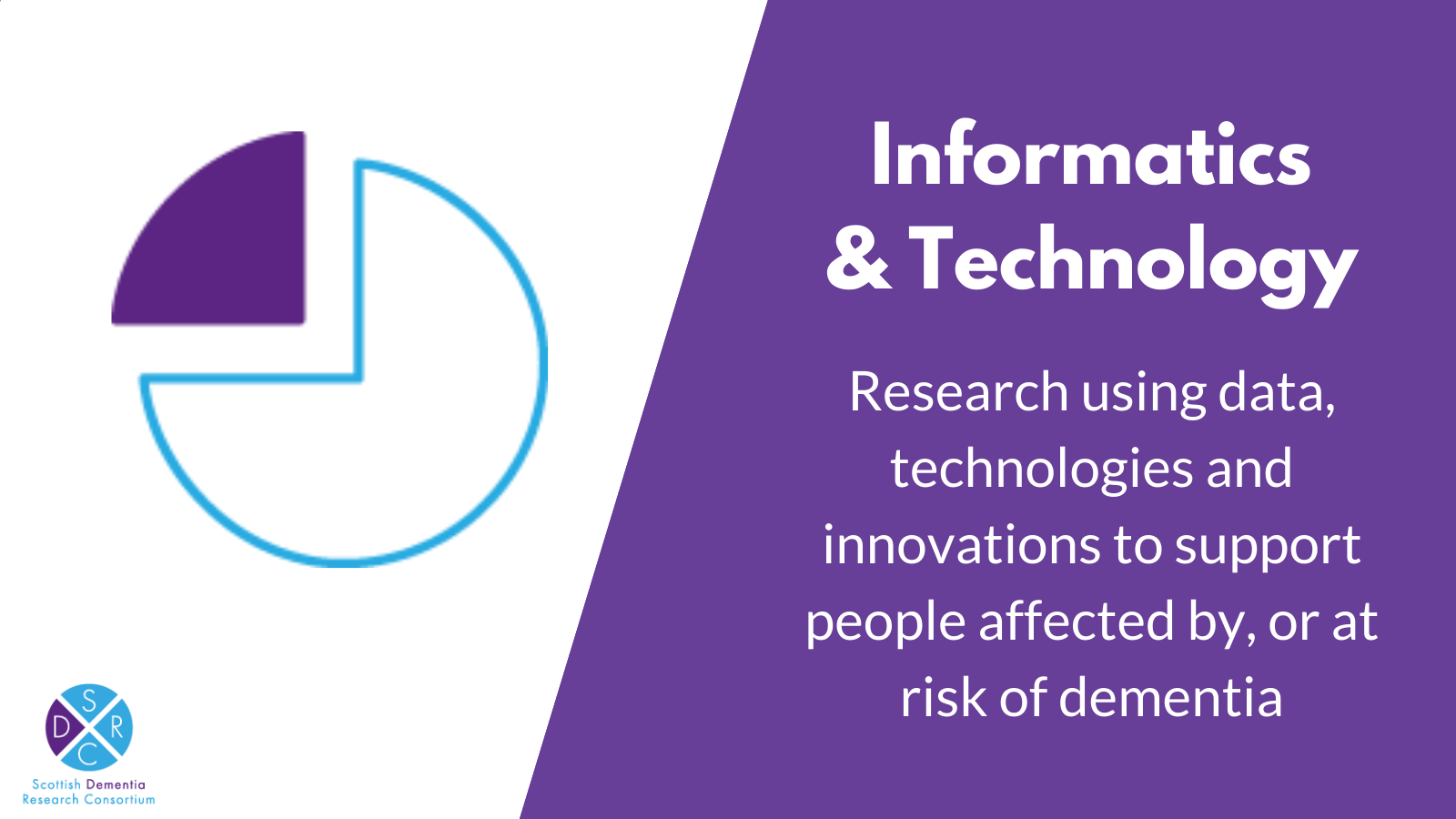The following is an excerpt of SDRC Annual Report 2022/23 which provides on overview of the research in the field of brain health Informatics & Technology, written by theme lead and SDRC Executive Committee member Dr Mario Parra Rodriguez.
Summary of the theme
The Informatics and Technology theme is wide-ranging and also supports the work of the other SDRC themes.
The Informatics part of the theme covers research which uses data that already exists to identify ways to improve the experience of dementia. This includes health data but can also include any other data, e.g social media
The Technology part of the theme involves developing technologies to support those living with or at risk of developing dementia. This includes harnessing the innovation and expertise that exists in many diverse disciplines to improve many aspects of the dementia journey: from improving brain health, diagnosis or supporting the day-to-day lives of people living with dementia and their loved ones.
Developments within theme
The SDRC and Digital Health & Care Innovation Centre (DHI) have entered a strategic alliance which is enabling new national and international collaborations. The synergies with DHI are creating new opportunities to bring relevant stakeholders together to explore national strengths to deliver technologies that can meet the expectations set by the government. This collaboration has led to international discussions involving representatives from Norway who were interested in learning about the Scottish Brain Health and Dementia Research Strategy and our use of using technology to support people living with dementia. A further meeting with a delegation from Denmark will be held in April 2023. These show the reputation Scotland has globally for innovation to support people living with dementia and those who care for them.
The synergies between the SDRC and the DHI are also creating opportunities to launch new funding schemes. In collaboration with Data Challenge and the DHI we recently launched a new funding scheme Find out more about the Brain Health and Data Challenge which attracted applications for industry and academic partners.
SDRC activity within theme in 2022
Work for the Informatics & Technology theme throughout 2022 has focused on activity which align with Alzheimer Scotland’s Technology Charter. This themes commitments include: working in partnership with people living with dementia and those who care for them to develop technologies that promote brain health, restores cognitive and functional abilities, and assist those who cannot longer live independently.
It is with these aims in mind that we have established a Special Interest Group (SIG) on Technologies for Brain Health and Dementia Prevention. Find out more about the Special Interest Group here
There are examples of research happening in Scotland which have attracted significant funding. One such examples if the project AMPER. AMPER is a one-million pound EPSRC funded project that brings together expertise on computer from the National Robotarium at Heriot-Watt University (Dr Dr. Mei Yii Lim and Prof Ruth Aylett) and on Cognitive Neuroscience of Ageing and Dementia from the University Strathclyde (Dr Mario A Parra). AMPER, which stands for ‘Agent-based Memory Prosthesis to Encourage Reminiscing’ will deliver new technologies that will assist people with dementia to access memories from their past and in so doing strengthen their self-esteem and feelings of belonging. The project involves key stakeholders such as the NHS Scotland Neuroprogressive and Dementia Network’s Partners in Research Initiative, the Informatics and Technology theme of the SDRC, the charity Sporting Memories, which delivers reminiscence therapy to people with dementia through video footage in day care centre settings, the Centre for Dementia Prevention, and the Latin American Network for Dementia Research.
As part of the theme another project worth highlighting which is carried out by colleagues from University of Glasgow (Patrizia Di Campli San Vito) is RadioMe: Adaptive Radio to Assist People with Mild Dementia in Their Own Home. The RadioMe system aims to help people with mild dementia in early stages living in their own home: wearable sensors will detect agitation and will trigger a change in music on the live radio stream, playing calming music to alleviate the stress. In addition, the system will also be able to embed reminders from a calendar in the live radio stream. The RadioMe collaboration between the University of Glasgow, the University of Plymouth and the Anglia Ruskin University in Cambridge brings together specialists in dementia research, music therapy, musical computation and human computer interaction.

